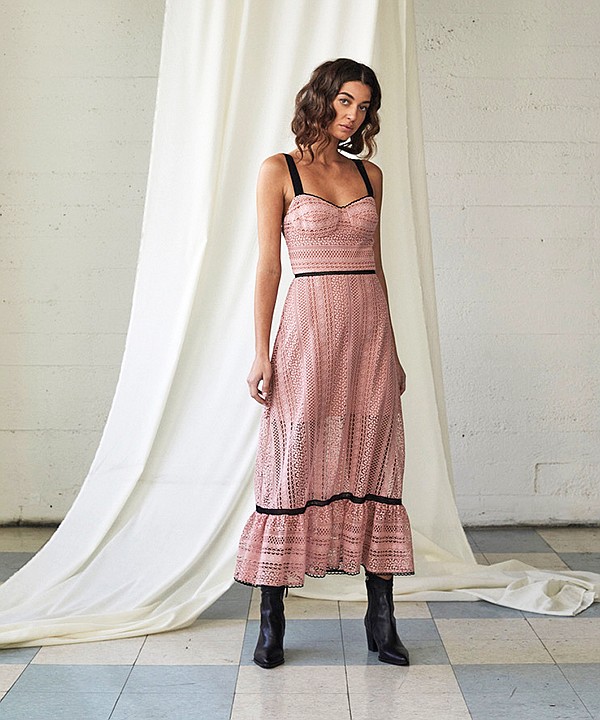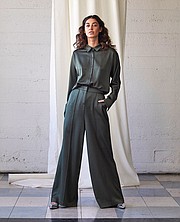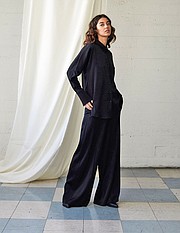MANUFACTURING
Slow-Fashion Approach Supports Sustainable Evolution at Allen Schwartz
Following the 2017 transition of his company from ABS by Allen Schwartz into a simpler, eponymous Allen Schwartz brand, the company’s founder continued to focus on remaining true to a core mission of improving fashion by making better garments. This included trusting the design leadership of Bianca Bernal, the company’s creative director and designer, who has worked with the company since 2012.
While many brands talk about making fast changes to overhaul their production practices into a more-sustainable brand, Bernal’s approach is based on the belief that slower shifts, including remaining abreast of new technologies and deeply examining how they can benefit the planet and brand, are key. Through its textile mills in Japan and Italy, the brand is able to incorporate fabrics that are kinder to the environment.
“We’re not a fast-fashion company. We don’t produce thousands of units. It’s contemporary,” Bernal said. “We produce small batches, which means we have to work with mills that do smaller runs of fabrications. It’s easier to develop things. They come up with new items, and I am just fascinated that they are available to me.”
The company has been committed to ethical practices before sustainability became trendy by manufacturing its pieces in downtown Los Angeles and ensuring its partners provide an ethical workplace environment. This year it is evolving through advancements in apparel manufacturing.
Pieces for the Allen Schwartz brand are available at allenschwartz.com and through select boutique retailers. Bernal knows they are looking for pieces that look good and will sell well, but she also recognizes an opportunity to educate her customer. Through her designs, she is showcasing the good works the company is performing by allowing customers to experience these types of fabrications for themselves.
“It starts with the fabric, and it’s my responsibility to offer [responsible fabrications] because the consumer doesn’t know,” she said. “The consumer thinks about it and reads about it, but if it isn’t available, how can they really know?”
While Bernal is educated through contacts at her mills, she is able to also educate the Allen Schwartz customer regarding its 100 percent recycled poly chiffon and satin fabric created from recycled plastic water bottles.
“Our costumer knows what she wants, and she knows what is going on in the environment,” Bernal said. “We are just here to offer it and for her to enhance that lifestyle she has in which she is aware of what is going on in the world, and if she can do that through fashion we are happy to be here for her to use our pieces as a tool to express herself.”
With a design method that incorporates the knowledge of the Allen Schwartz customer, Bernal blends this with her own, personal approach to fashion to create pieces that are priced at $150 to $300 wholesale and sized 0–12 and XS–L. Taking the time to create investment pieces that can be worn for years to come, the designer emphasizes that seemingly simple approaches such as deeply knowing her mill partners and their practices and revisiting the brand’s classics from its last 35 years of business help her to continue a slow approach to fashion.
“We continue to have in every collection our core silhouettes, which we stand behind. I want to design things that are timeless,” Bernal said. “It’s easy to put bells and whistles on it when you design. It’s easier to design crazy things, but there is so much more thought that goes into something that you can wear for a long period of time.”
Not only has Allen Schwartz worked with its mills to incorporate more-sustainable materials in its garments, but the brand is also taking extra steps to ensure its legacy is on the right side of history. Packaging for the brand’s shipments now includes 100 percent recycled poly bags. In a Jan. 9 post on Instagram, the company announced its commitment to donate 100 percent of its profits generated over a 24-hour period to WIRES Wildlife Rescue in Australia to aid the fire-stricken region.
“It’s the effort and integrity behind it,” Bernal explained. “That is what slow fashion is to us.”
Photos courtesy of Allen Schwartz.
























